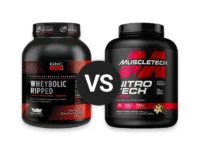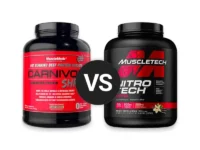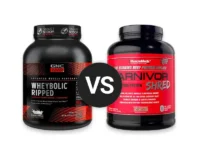Knowledge BaseYou're Questions Answered
How do fat burning protein powders work?
Fat-burning protein powders are designed to support both muscle building and fat loss through a combination of high-quality protein and additional ingredients that enhance metabolism and promote fat oxidation. These supplements aim to provide the benefits of traditional protein powders while incorporating components that help accelerate weight loss and improve body composition.
Mechanisms of Action
Fat-burning protein powders work through several mechanisms:
- Increased Protein Intake: Protein is essential for muscle repair and growth, which can boost your metabolism. Muscle tissue burns more calories at rest compared to fat tissue, so increasing muscle mass can help increase overall calorie expenditure1.
- Thermogenesis: Many fat-burning protein powders contain thermogenic ingredients like caffeine and green tea extract. Thermogenesis is the process of heat production in the body, which increases energy expenditure and can lead to greater calorie burn23.
- Fat Oxidation: Ingredients such as L-carnitine and CLA (Conjugated Linoleic Acid) are included to promote the oxidation of fatty acids. L-carnitine helps transport fatty acids into the mitochondria, where they are burned for energy, while CLA has been shown to reduce body fat in some studies45.
- Appetite Suppression: Protein is known to have a satiating effect, helping to reduce hunger and overall calorie intake. Additionally, some fat-burning protein powders contain fiber or other appetite suppressants to help control hunger6.
Key Ingredients
The effectiveness of fat-burning protein powders largely depends on their ingredient profile. Common ingredients include:
- Whey Protein: A fast-digesting protein rich in essential amino acids that supports muscle growth and recovery.
- Caffeine: A stimulant that increases metabolic rate and promotes fat oxidation, helping to burn more calories2.
- Green Tea Extract: Contains catechins and caffeine, which together enhance fat oxidation and thermogenesis3.
- L-Carnitine: An amino acid that aids in the transport of fatty acids into mitochondria for energy production4.
- CLA: A fatty acid that may help reduce body fat and increase lean muscle mass5.
Practical Usage
For optimal results, fat-burning protein powders should be integrated into a balanced diet and regular exercise routine. They can be used as a meal replacement, a post-workout shake, or a snack to help meet protein needs and support weight loss goals. It's important to monitor overall caloric intake and ensure that the use of these supplements aligns with your dietary and fitness objectives.
While fat-burning protein powders can aid in weight loss, they are not a magic solution. Consistent exercise, proper nutrition, and healthy lifestyle habits are crucial for achieving and maintaining a lean, healthy body.
- Phillips, S. M., & Van Loon, L. J. C. (2011). Dietary protein for athletes: From requirements to optimum adaptation. Journal of Sports Sciences, 29(sup1), S29-S38.
- Astrup, A., Toubro, S., Cannon, S., Hein, P., Breum, L., & Madsen, J. (1990). Caffeine: a double-blind, placebo-controlled study of its thermogenic, metabolic, and cardiovascular effects in healthy volunteers. The American Journal of Clinical Nutrition, 51(5), 759-767.
- Hursel, R., & Westerterp-Plantenga, M. S. (2010). Thermogenic ingredients and body weight regulation. International Journal of Obesity, 34(4), 659-669.
- Brass, E. P. (2000). Supplemental carnitine and exercise. The American Journal of Clinical Nutrition, 72(2), 618S-623S.
- Whigham, L. D., Watras, A. C., & Schoeller, D. A. (2007). Efficacy of conjugated linoleic acid for reducing fat mass: a meta-analysis in humans. The American Journal of Clinical Nutrition, 85(5), 1203-1211.
- Leidy, H. J., Tang, M., Armstrong, C. L., Martin, C. B., & Campbell, W. W. (2011). The effects of consuming frequent, higher protein meals on appetite and satiety during weight loss in overweight/obese men. Obesity, 19(4), 818-824.
Related Questions
Related Reviews

Your Answer
We are a participant in the Amazon Services LLC Associates Program, an affiliate advertising program designed to provide a means for us to earn fees by linking to Amazon.com and affiliated sites.


